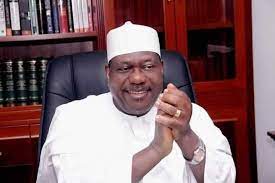1960s Nigeria was a period rife with identity politics pitting one region against the other. And that was by no accident.
Th e political structures of the country were crafted around the 3 major ethnic groups and they took on one another seeking dominance.
In each premier of the regions was an ethnic champion with aspirations that led to deep divisions so much so there were frequent clashes between Prime Minister Abubakar Tafawa Balewa who spoke for the country and the premier of the northern region, Ahmadu Bello who always put the North fi rst.
Th e January 1966 coup was the fi rst fall out of the country’s governing structures and also the fi rst in a series of events that ended in a 30-month civil war.
Th e response of the military government headed by Aguiyi Ironsi to was to alter the political structures that were dividing the country.
He did this by chipping away at regional/ethnic set up with the creation of states and concentrating more powers in the hands of the federal government.
Unfortunately for Ironsi, the existing regional structures had already done damage to the unity of the country and the seeds of hate were by this time planted in the hearts of many of its citizens.
After the fi rst coup came the July countercoup and the resulting civil war.
One legacy Ironsi however left behind was the creation of states and concentration of power in a central government.
Every successive government since then has found it in its wisdom to retain these structures and even strengthen them.
Without a doubt, those who do not know history are condemned to repeat its mistakes which begs the question why a number of enlightened citizens, some very infl uential are pushing to go back to the same structures that led to deep and violent divisions in the country.
Now, there is a big diff erence between what is in the best interest of Nigeria and its unity, and building a loose federation that best carters of the interests of ethnic nationalities.
In the debate for restructuring, Afenifere’s Ayo Adebanjo cherry-picks which part of the past to remember, almost suggesting the military acted in a vacuum when abolishing the regional structures rather than responding to structural defects that had already turned violent with the threat of more to come.
But somehow, he manages to fi nd all the right words to raise people’s passions and emotions based on perceived injustice being meted out by rival ethnic groups.
In part, the push to restructure is being driven by the hope of accommodating the secessionist demand of the Indigenous People of Biafra for the creation of an independent state based on ethnic character.
Maybe the most high profi le person that has come out in support of restructuring is former vice president, Atiku Abubakar and with him, it is obvious his position cannot be separated from personal political goals.
But in recent times, he has been leaning more towards the devolution of powers as recommended by the last constitutional conference.
More generally speaking, those calling for restructuring represent tribal restrictions and are thinking of how to maximize political and economic gains from the federation even at the expense of the country’s unity and viability as a nation.
Th e most extreme views want the dissolution of the country called Nigeria.
And the more moderate views are those couching their argument in economic and fi nancial terms rather than political structures.
At the heart of this is the right to collect to taxes by the federal and sharing of this revenue by the units that make up the federation.
In place of this present system again is the 1960s model where each region generates its own revenue, is self-suffi cient and makes contributions to the government to the centre.
Th e problem with this is that it will lead Nigeria down the same road as it did in the fi rst republic, which could end in disintegration considering its level of development.
One country that has a similar model and has not led to disintegration is Germany.
But then it has an equalization system where not only the federal government but also richer states make direct fi nancial transfers to weaker states so no state is left undeveloped.
Th e equalization law has been in place for over 60 years and will not be phased out until 2020.
Now Nigeria is no Germany.
It is no secret that the Niger Delta, which makes up less than a fi fth of the country’s population, is responsible for a chunk of its revenues.
Th e present structures, taxation and revenue sharing laws are in a way an attempt at redistribution of wealth.
Nigeria will probably seize to exist without the mechanism to develop all parts of the country.
Th ere is maybe no better phrase to describe the ramifi cations of income inequality than that of JeanJacques Rousseau: ‘When the people shall have nothing more to eat, they will eat the rich.
’ And when that inequality is between nations and states with one side living in riches and the other abject poverty, the result is an unprecedented and unstoppable level of migration that breeds hate, maybe even violence.
We don’t need to look any further than the rate young African are fl eeing to a European continent that doesn’t them.
To address this, European nations are not only building walls to keep us out, they also coming up urgent policies to lift the living standards all across Africa.
Within Nigeria, the level of poverty across the country is not even and with many states unable to fend for themselves, any sudden change in revenue generating/sharing laws could prove catastrophic.
Restructuring based on the 1960s model may aggravate the already acute income disparity between many of the states.
With the hate and the violence that could ensue, it could very well be a slow and more clandestine way to push for the breakup of Nigeria.
Shuaib writes from Abuja



